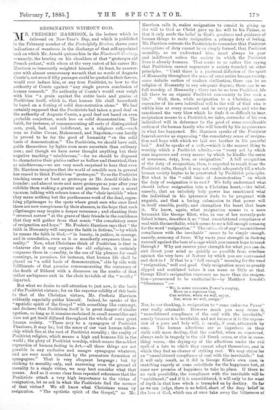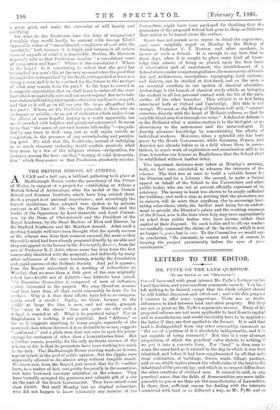RESIGNATION WITHOUT GOD.
MR. FREDERIC HARRISON, in the lecture which he delivered on New-Year's Day, and which is published in the February number of the Fortnightly Review, shows some indications of weariness in the discharge of that self-appointed task on which Mr. Arnold quizzes him in the Nineteenth Centuey, —namely, the bearing on his shoulders of that "grotesque old French pedant," with whom at the very outset of his career Mr. Harrison so innocently weighted himself. At least, he asseverates with almost unnecessary warmth that no words of Auguste Comte's, not even if fifty passages could be quoted in their favour, would ever induce him, or any true Positivist, to bow to the authority of Comte against "any single proven conclusion of human research." No authority of Comte's would ever weigh with him " a grain against the entire basis and genius of Positivism itself, which is. that human life shall henceforth be based on a footing of solid demonstration alone." We had certainly supposed that the Positivists had taken a good deal on the authority of Auguste Comte, a good deal not based on even probable conjecture, much less on solid demonstration. The habit, for instance, of commemorating all sorts of distinguished men, good, bad, and indifferent, as a religious cult, —such men as Julius Cmsar, Mahommed, and Napoleon,—can hardly be proved to be for the good of humanity " on the solid basis of demonstration." The Positivists, we should have said, guide themselves by lights even more uncertain than ordinary men ; and though we have never thought anything but their negative teaching " mischievous,"—for we should be disposed to characterise their pieties rather as hollow and theatrical, than as mischievous,—we are very much surprised to hear that even Mr. Harrison imagines that the world of sensible men in general has ceased to think Positivism " grotesque." To us the Positivist teaching seems at least as grotesque as Mr. Arnold thinks its founder; and almost more and more grotesque as year after year exhibits them making a greater and greater fuss over a moral vacuum, talking with solemn tones of the "choir invisible" when they mean nothing but the posthumous work of the dead, organ. ising pilgrimages to the spots where great men who once lived there are now conspicuous by their absence, in the hope that such pilgrimages may inspire a deeper reverence ; and chanting their " reverent sorrow " at the grave of their friends in the confidence that they will gather from that music "the consolatory sense of resignation and hope." Mr. Frederic Harrison says that the faith in Humanity will surpass the faith in fictions,"—by which he means the faith in God,—" in beauty, in pathos, in courage, and in consolation, even as it so manifestly surpasses them in reality." Now, what Christians think 'of Positivism is that in whatever else it may surpass the old religions, it certainly surpasses them in unreality, in the use of big phrases for small meanings, in promises, for instance, that human life shall be placed on "a solid basis of demonstration," side by side with fulfilments of that promise commemorating the centenary of the death of Diderot with a discourse on the merits of that rather ambiguous unit in the choir invisible of the " worthy " departed.
But what we desire to call attention to just now, is the basis of the Positivist virtues ; for on the superior solidity of this basis to that of the Christian virtues, Mr. Frederic Harrison evidently especially prides himself. Indeed, he speaks of the " egotistic spirit of the Gospel " with something like contempt, and declares that Positivism itself is in great danger of similar egotism, so long as it remains enshrined in small assemblies and does not get itself diffused throughout the whole of some great human society. "There ropy be a synagogue of Positivist Pharisees, it may be; but the sense of our vast human fellowship which lies at the root of Positivist morality ; the reality of Positivist religion, which means a high and humane life in the world ; the glory of Positivist worship, which means the noblest expression of human feeling in Art,—all these things are not possible in any exclusive and meagre synagogue whatever, and are very much retarded by the premature formation of synagogues." That is very eloquent language ; but by sticking to morality only, and narrowing even the ground of morality to a single virtue, we may best consider what that means. And as it seems clear from repeated references that the Positivists attach a very high importance to the virtue of resignation, let us ask in what the Positivists find the essence of that virtue ? We all know what Christians mean by resignation. " The egotistic spirit of the Gospel," as Mr. Harrison calls it, makes resignation to consist in giving up the will to God as Christ gave up his will to his Father, so that it only needs the belief in God's goodness and guidance of human things to make resignation a primary duty of feeling. Mr. Harrison entreats the Positivists to remember that Positivist conceptions of duty cannot be so simply formed, that Positivist morality, as we understand him, must always be poor and indifferent unless the society in which the Positivist lives is already humane. That seems to us rather like saying that Positivism cannot regenerate a society founded on other principles. " Until there is a Profound diffusion of the spirit of Humanity throughout the mass of some entire human society, sonic definite section of modern civilisation, there can be no religion of Humanity in any adequate degree ; there van be no full worship of Humanity ; there can be no true Positivist life till there be an organic Positivist community to live such a life." Well, then, while resignation to a Christian means surrender of his own individual will to the will of God who is within him at every moment and in every place, and who has sanctioned the very blow which he finds it so difficult to bear, resignation means to a Positivist, we infer, surrender of his own individual will in deference to the good of some considerable section of the human family who will benefit by his acquiescence in what has happened. Mr. Harrison speaks of the Positivist funeral-service as expressing " the consolatory sense of resignation and hope with which we laid our brother in Isis peaceful bed." And he speaks of a cult,—which is the nearest thing to worship which a Positivist admits,—as "every act by which man impresses and every means by which ho kindles the sense of reverence, duty, love, or resignation." A full recognition of the duty of resignation, then, is expected to result from the Positivist cults, though it may not result adequately till a whole human society begins to be penetrated by Positivist principles.
Bnt what is the " solid basis of demonstration" on which the duty of resignation is to rest ? We fully understand what should infuse resignation into a Christian heart,—the belief, namely, that an infinitely holy power has sanctioned what the individual in his ignorance finds to be pregnant with anguish, and that a loving submission to that power will in itself ennoble, purify, and strengthen the heart that bears it. We know, again, what resignation means to a mere humanist like George Eliot, who, in one of her recently-pub lished letters, describes it as " that unembittered compliance of soul with the inevitable, which seems to me a full enough meaning for the word resignation.' " The rat ionale of any " unembittered compliance with the inevitable " seems to be simple enough,
namely, economy of force. Why waste your strength in dashing yourself against the bars of a cage which you cannot hope to break through ? Why not reserve your strength for what you can de, and divert your mind as quickly as possible from rebellion against the very laws of Nature by which you are surrounded and shut-in ? If that be a " full enough " meaning for the word
" resignation," well and good. Only resignation must be greatly clipped and mutilated before it can mean so little as that. George Eliot's resignation expresses no more than the resigna tion—pronounced to be unattainable—by Matthew Arnold's " Obermann " .
" We, in some unknown Power's employ,
Move on a rigorous line, Can neither, when we will, enjoy, Nor, when we will, resign."
Nor, to our thinking, is resignation to "some unknown Power"
ever really attainable. However much you may desire it, "unembittered compliance of the soul with the inevitable," merely because it is inevitable, and not because it is the expression of a pure and holy will, is rarely, if ever, attainable by man. The human affections are so imperious in their strife with mere destiny, that the conflict, when so conceived, always ends in tragedy in the old Greek sense, or else in some thing worse,—the drying-up of the affections under the evil spell of a fate to which they cannot adapt themselves, and in which they find no chance of striking root. We may strive for an " unembittered compliance of soul with the inevitable ;" but it will only result, as it did in George Eliot's own case, in
snatching eagerly at some substitute for the happiness loot, at some new promise of happiness to take its place. If there be no such possibility, the compliance with the inevitable will be " embittered ;" and if it is unembittered, it will only be for want of depth in that love which is trampled on by destiny. So far as we can judge, there is no belief, short of the deep belief:in the love of God, which can at once take away the bitterness of
a great grief, and make the surrender of will hearty and purifying.
On what do the Positivists base the duty of resignation ? Certainly they would hardly be content with George Eliot's impossible virtue of " unembittered compliance of soul with the inevitable," both because it is frigid, and because in all serious cases of anguish of mind it is impossible. Besides, Mr. Harrison expressly tells us that Positivism inspires " a consolatory sense of resignation and hope." Where is the consolation ? Where is the hope ? Is it consolatory to reflect that the good has triumphed in a man's life, at the very moment when the good that triumphed is extinguished by his death, extinguished at least as a living power, and is to be confined for the future to the vestiges of what may remain from the past ? Is the hope to consist in a sanguine expectation that we shall learn to value all the more that which we painfully miss and can never regain? Are we to take consolation in thinking that another thread in our lives is snapped, and that so it will go on till our own life drops altogether into the past ? Where, on the Positivist principle, is there any sin in despair or suicide,—in an act of abdication which makes room for others of more hopeful destiny in a world apparently too much crowded with helpless and paralysed existences ? It seems to us that " the sense of our vast human fellowship "—unqualified by any trust in God—may just as well enjoin suicide as resignation, in the presence of any overwhelming and paralysing grief. We wish that the Positivists, instead of indulging in so much eloquent verbosity, would explain precisely what they mean by a few of the religious virtues—resignation, for instance, among the first—on that " footing of solid demonstration" which they assure us that Positivism absolutely enjoins.



































 Previous page
Previous page